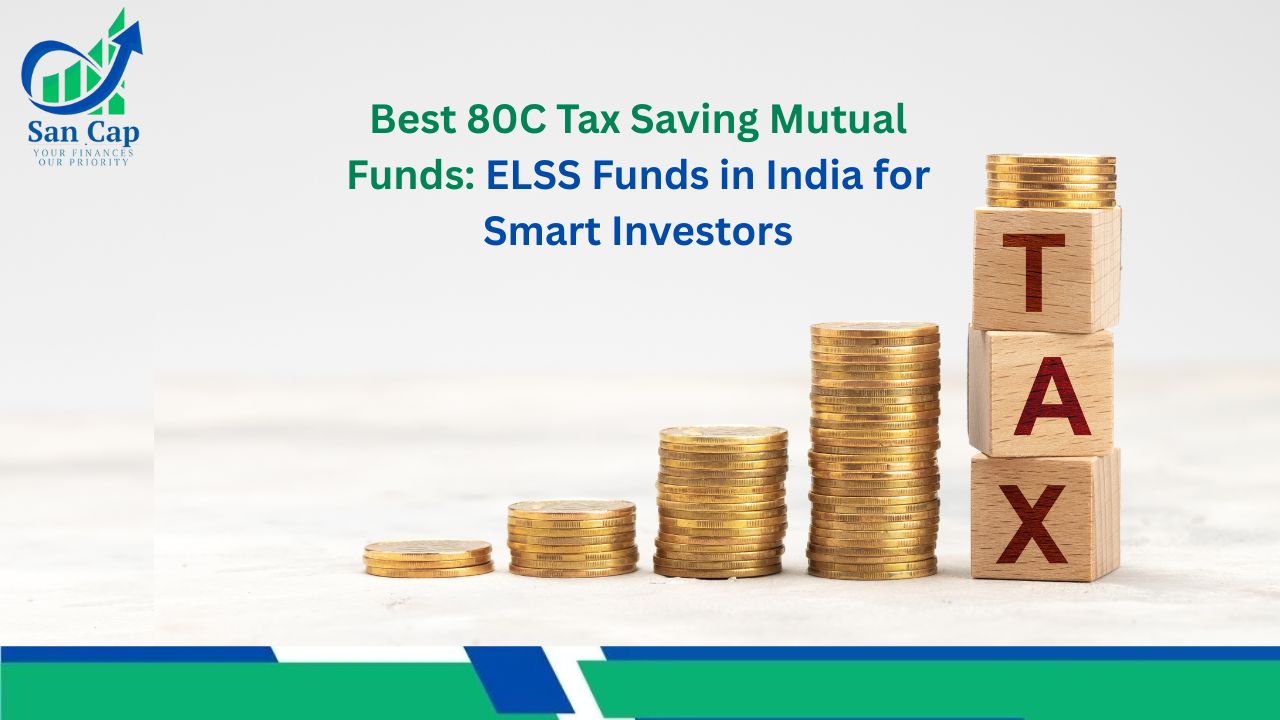If you are looking to save tax and increase your wealth, ELSS (Equity Linked Savings Schemes) is one of the most effective schemes available under Section 80C of the Income Tax Act. Now, what makes ELSS an ideal fit for investors who are demanding equity exposure and tax benefits?
In this blog, let’s best analyze the best 80C tax saving mutual funds, the top ELSS tax saving funds in India, and how to choose an ELSS fund that is best for your financial goals.
What is an ELSS Fund?
ELSS or Equity Linked Saving Scheme is a type of mutual fund that primarily invests in equity and equity-related instruments. The part where it captures the attention is its tax benefit under section 80C, that allows investors to claim up to ₹1.5 lakh deductions in a financial year. This makes ELSS as one of the best options among tax-saving schemes.
Investment benefits in ELSS
- Shortest Lock-in of only 3 years: As compared to 5+ years for PPF or NSC, the lock-in period for ELSS is only 3 years from the date of investment.
- High Returns potential: Market-linked returns often perform better than other 80C options.
- Dual Benefits: Save taxes and invest in equity markets simultaneously.
Top ELSS Tax Saving Fund in India (2025)
With hundreds of ELSS funds in the market, identifying top artists may feel heavy. The best fund that sets is not only high returns, but they manage constant risk, maintain portfolio discipline, and are aligned with investors’ goals. Top ELSS funds are commonly managed by experienced professionals, following a well -researched investment strategy, and showing flexibility during market instability. Instead of chasing recent winners, smart investors focus on long -term stability when choosing their ELSS investment, reputation of fund houses and transparency in operation.
How to Pick the Perfect ELSS Fund for Your 80C Investment Plan
The mantra to choose the right ELSS is not about pursuing the highest returns, but it is about aligning with your financial goals. Below are some of the best practices of how to choose an ELSS fund wisely:
- Consistent Past Performance: Rather than getting swayed by short-term outperformance, focus on the funds that have been delivering stable and consistent returns from the past 5 -7 years.
- Low Expense Ratio: The expense ratio determines the annual fee charged by the fund house for managing your money. A small difference of the expense ratio can make a significant impact on your final returns. And when it comes to a 10-15 years investment, a difference of 0.5% and 1.5% expense ratio is huge.
- Experienced Fund Manager: Behind every top-performing mutual fund is a skilled fund manager. Check the fund manager’s tenure with the fund, their track record across different funds, and how long they’ve been managing that specific ELSS scheme.
- Portfolio Quality: A well-diversified ELSS fund spreads its investments across sectors and market caps to reduce risk. Ideally, look for a healthy mix of large-cap stability, mid-cap growth, and selective small-cap exposure.
- Fund Size & AUM: Avoid extremely large or very small mutual funds when choosing an ELSS. Oversized funds can struggle with agility, while very small ones may lack consistency or investor trust. Mid-sized funds often strike the right balance between performance stability and fund management flexibility.
Still unsure? Use mutual fund comparison tools or speak to a financial advisor.
SIP vs Lumpsum in ELSS – What’s Better?
SIP is ideal for salaried individuals who want to average out market volatility and invest systematically in the funds.
Whereas Lumpsum works best for individuals having a year-end bonus, any kind of passive income or if you want to exhaust your 80C limit in one go.
However, both options qualify for full 80C tax deduction, so the option depends majorly on your cash flow.
To sum up the above, if you’re aiming to save taxes and build long-term wealth, investing in the top ELSS tax saving funds in India is a smart strategy. These best 80C tax saving mutual funds not only reduce your tax burden but also give you an opportunity to grow your capital through equity markets.
No matter if you’re starting your investment with ₹500 or ₹50,000, knowing how to choose an ELSS fund can make the actual difference.
Disclaimer: This blog is for educational purposes only and not financial advice. Mutual fund investments are subject to market risks. Please consult a certified financial advisor before investing.
